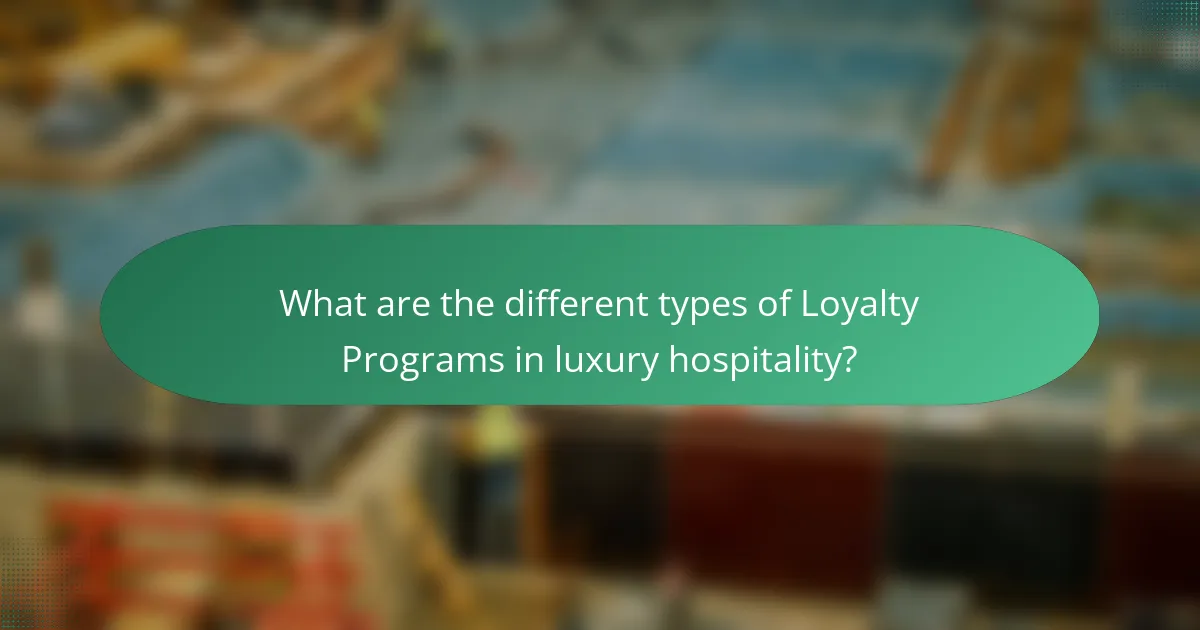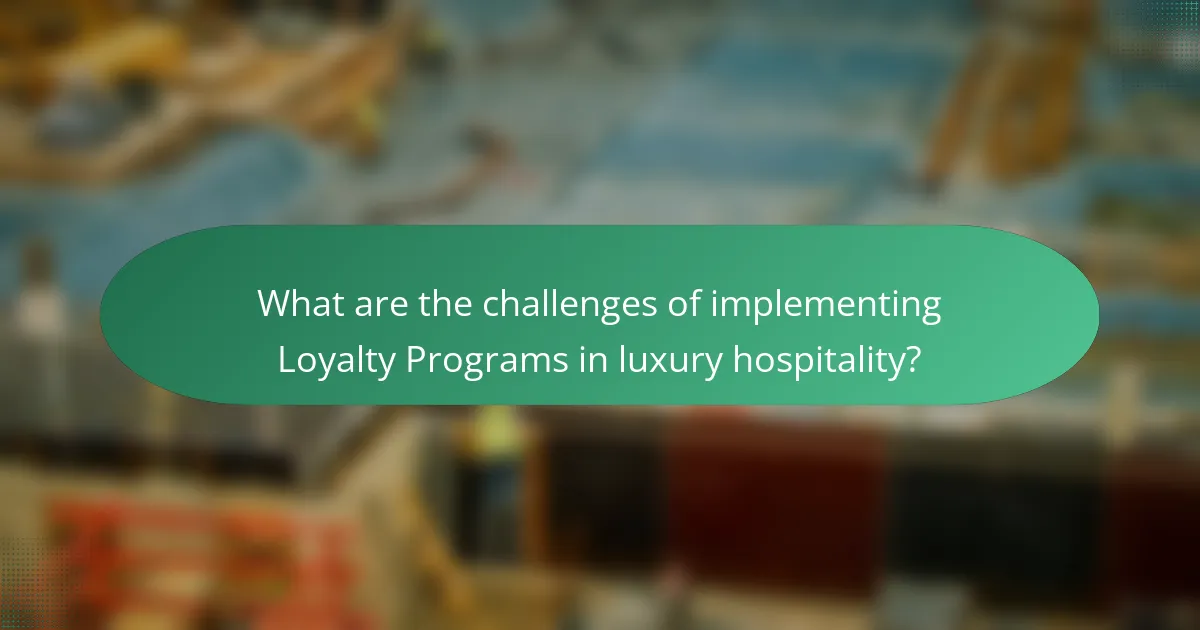Loyalty programs in luxury hospitality are structured initiatives designed to reward repeat customers with exclusive benefits such as room upgrades, personalized services, and special event access. These programs aim to enhance customer retention and increase brand loyalty, which is crucial for maximizing profitability in a competitive market. The article outlines various types of loyalty programs, including tiered, point-based, and experiential programs, each designed to boost customer engagement. It also addresses the challenges of implementing these programs, such as ensuring personalization, maintaining exclusivity, integrating technology, managing data privacy, and measuring effectiveness. Understanding these elements is essential for luxury hotels and resorts to successfully leverage loyalty programs to drive revenue and customer satisfaction.

What are Loyalty Programs in Luxury Hospitality?
Loyalty programs in luxury hospitality are structured initiatives designed to reward repeat customers. These programs often offer exclusive benefits such as room upgrades, personalized services, and special access to events. They aim to enhance customer retention and increase brand loyalty. High-end hotels and resorts typically implement these programs to differentiate themselves in a competitive market. Statistics show that loyal customers can generate up to 80% of a brand’s revenue. Thus, effective loyalty programs are crucial for maximizing profitability in luxury hospitality.
How do Loyalty Programs function in the luxury hospitality sector?
Loyalty programs in the luxury hospitality sector reward repeat customers with exclusive benefits. These programs typically offer tiered membership levels based on customer spending. Higher tiers provide increased perks such as room upgrades, complimentary services, and personalized experiences. Members earn points for each stay, which can be redeemed for future rewards.
Luxury brands often use loyalty data to tailor marketing and enhance guest experiences. This personalization fosters stronger customer relationships and encourages brand loyalty. According to a study by Deloitte, 60% of luxury consumers prefer personalized experiences. This statistic underscores the importance of loyalty programs in engaging high-value customers in the luxury sector.
What are the key components of a Loyalty Program in luxury hospitality?
Key components of a Loyalty Program in luxury hospitality include personalized rewards, tiered membership levels, exclusive experiences, and seamless integration with customer service. Personalized rewards cater to individual preferences and enhance guest satisfaction. Tiered membership levels incentivize repeat visits and increase customer engagement. Exclusive experiences, such as private events or upgrades, create a sense of belonging among loyal customers. Seamless integration with customer service ensures that members receive consistent and high-quality interactions, reinforcing loyalty. These components are essential for fostering long-term relationships and enhancing customer retention in luxury hospitality.
How do these components enhance customer experience?
Loyalty programs enhance customer experience by providing personalized rewards and recognition. These programs offer exclusive benefits such as room upgrades, late checkouts, and tailored offers. Customers feel valued when their preferences are acknowledged. This recognition fosters emotional connections between the brand and the customer.
Statistically, 70% of consumers are more likely to recommend a brand with a good loyalty program. Additionally, loyalty members tend to spend 12-18% more than non-members. These components create a sense of belonging and encourage repeat visits. Ultimately, enhanced experiences lead to increased customer satisfaction and brand loyalty.
What are the primary benefits of Loyalty Programs for luxury hospitality brands?
Loyalty programs for luxury hospitality brands primarily enhance customer retention and increase revenue. These programs incentivize repeat visits through exclusive rewards and personalized experiences. They foster brand loyalty by creating emotional connections with customers. Statistics show that loyal customers are 60% more likely to book again. Additionally, loyalty programs provide valuable customer data for targeted marketing. This data helps brands tailor offerings to individual preferences. As a result, luxury hospitality brands can improve customer satisfaction and overall experience. Ultimately, effective loyalty programs lead to higher lifetime value per customer.
How do Loyalty Programs increase customer retention?
Loyalty programs increase customer retention by incentivizing repeat purchases. They offer rewards such as discounts, exclusive access, and personalized services. These incentives create a sense of belonging and appreciation among customers. Research shows that customers enrolled in loyalty programs are 60% more likely to return. Additionally, loyalty programs encourage customers to spend more to achieve rewards. This increased spending contributes to overall revenue growth for businesses. Furthermore, loyalty programs often gather customer data, allowing for tailored marketing strategies. Tailored experiences enhance customer satisfaction and loyalty. Overall, loyalty programs foster long-term relationships between customers and brands.
What financial advantages do Loyalty Programs offer to luxury hotels?
Loyalty programs offer significant financial advantages to luxury hotels. They enhance customer retention, leading to increased repeat bookings. According to a study by the Harvard Business Review, increasing customer retention by just 5% can boost profits by 25% to 95%. Loyalty programs also encourage higher spending per visit, as members often seek to maximize their benefits. This results in increased average daily rates (ADR) and overall revenue. Furthermore, loyalty programs can reduce marketing costs. Retaining existing customers is generally less expensive than acquiring new ones. Additionally, they provide valuable data on customer preferences, enabling targeted marketing strategies that can drive sales.
How do Loyalty Programs foster customer engagement in luxury hospitality?
Loyalty programs foster customer engagement in luxury hospitality by creating personalized experiences and building emotional connections. These programs reward repeat customers with exclusive benefits, enhancing their overall experience. Personalization in rewards, such as tailored offers and upgrades, makes customers feel valued. Emotional connections are strengthened through recognition and appreciation of customer loyalty. Research indicates that 79% of consumers are more likely to engage with brands that offer personalized experiences. By providing unique experiences, loyalty programs increase customer retention rates. Enhanced engagement leads to higher spending, as loyal customers are more likely to book premium services.
What strategies are effective for enhancing customer interaction through Loyalty Programs?
Effective strategies for enhancing customer interaction through loyalty programs include personalized rewards and tiered benefits. Personalized rewards cater to individual preferences, fostering a deeper connection. For instance, data analytics can identify customer behaviors and preferences, allowing tailored offers. Tiered benefits create a sense of achievement, motivating customers to engage more frequently. According to a study by Bond Brand Loyalty, 79% of consumers are more likely to engage with brands that offer personalized experiences. Additionally, implementing gamification elements can further increase interaction by making the loyalty experience more engaging and fun.
How can luxury hotels personalize their Loyalty Program offerings?
Luxury hotels can personalize their Loyalty Program offerings by utilizing guest data to tailor experiences. They analyze preferences, booking history, and feedback. This allows hotels to create customized rewards and offers. For example, a guest who frequently books spa services may receive discounted spa treatments.
Additionally, luxury hotels can implement tiered membership levels. Each level can provide unique benefits that cater to different guest preferences. Personalized communication, such as birthday greetings or tailored recommendations, enhances the guest experience.
According to a study by Deloitte, 80% of consumers are more likely to make a purchase when brands offer personalized experiences. This supports the effectiveness of personalization in loyalty programs.

What are the different types of Loyalty Programs in luxury hospitality?
The different types of loyalty programs in luxury hospitality include tiered programs, point-based programs, and experiential programs. Tiered programs reward customers based on their spending levels. Higher tiers offer exclusive benefits such as room upgrades and personalized services. Point-based programs allow guests to earn points for each stay. Points can be redeemed for free nights or luxury experiences. Experiential programs focus on unique experiences rather than points. They may include curated events or access to exclusive destinations. Each type enhances customer engagement and loyalty in luxury hospitality.
How do tiered Loyalty Programs operate in luxury hotels?
Tiered loyalty programs in luxury hotels operate by categorizing members into different levels based on their spending and engagement. Each tier offers progressively enhanced rewards and benefits. For example, entry-level members may receive basic perks like room upgrades. Higher tiers often include additional benefits such as complimentary services, exclusive access to events, and personalized experiences.
These programs incentivize repeat bookings and customer loyalty. According to a study by Phocuswright, 75% of consumers are more likely to book with a hotel that offers a loyalty program. This structure encourages guests to increase their spending to attain higher tiers, thereby enhancing overall revenue for the hotel.
What are the advantages of tiered structures for customers?
Tiered structures for customers enhance loyalty program effectiveness. They provide customers with clear incentives to engage more frequently. Each tier offers escalating rewards, motivating customers to achieve higher levels. This creates a sense of exclusivity and appreciation. Customers feel valued as they progress through tiers. Research indicates that tiered programs can increase customer retention by up to 20%. Additionally, tiered structures encourage higher spending to unlock better rewards. This ultimately boosts revenue for luxury hospitality brands.
How do tiered programs impact customer loyalty?
Tiered programs enhance customer loyalty by incentivizing repeat purchases through a structured rewards system. These programs typically offer increasing benefits as customers ascend tiers. Higher tiers often provide exclusive perks, personalized services, and enhanced rewards. This motivates customers to engage more frequently to reach higher levels. Research shows that 70% of customers are more likely to stay loyal to brands with tiered loyalty programs. Additionally, tiered structures create a sense of achievement and status among customers. This emotional connection fosters long-term loyalty and brand advocacy.
What are the benefits of points-based Loyalty Programs?
Points-based loyalty programs offer several benefits to both businesses and customers. They incentivize repeat purchases by rewarding customers with points for each transaction. Customers can accumulate these points and redeem them for discounts, free products, or exclusive services. This system enhances customer retention, as individuals are more likely to return to earn and use their points.
Research indicates that loyalty programs can increase customer spending by up to 20% (Bain & Company, 2020). Additionally, these programs help businesses gather valuable customer data. This data can inform personalized marketing strategies, improving customer engagement. Points-based programs also foster a sense of belonging among customers, enhancing brand loyalty.
How do customers earn and redeem points in luxury hospitality?
Customers earn points in luxury hospitality through various activities such as booking stays, dining, and spa services. Each dollar spent typically translates to a specific number of points. Customers may also earn bonus points through promotions or partnerships with airlines and credit card companies. Points can be redeemed for free nights, upgrades, or exclusive experiences. Redemption options vary by hotel brand and may include limited-time offers or special events. Many luxury hotels have tiered loyalty programs that provide additional benefits as customers accumulate points. This structure incentivizes repeat business and enhances customer loyalty.
What unique offerings can enhance the points experience?
Unique offerings that can enhance the points experience include exclusive access to luxury events and personalized services. These offerings create memorable experiences that elevate customer satisfaction. For instance, members can receive invitations to private wine tastings or culinary events hosted by renowned chefs. Personalized services, such as dedicated concierge assistance, further enhance the experience by catering to individual preferences. Additionally, partnerships with high-end brands can provide members with unique rewards, such as luxury merchandise or exclusive travel opportunities. These unique offerings not only incentivize loyalty but also foster a deeper emotional connection with the brand.
What role do partnerships play in Loyalty Programs?
Partnerships enhance loyalty programs by broadening rewards and increasing customer engagement. They allow businesses to offer diverse benefits that appeal to a wider audience. For instance, a hotel chain may partner with airlines, enabling members to earn points for flights. This collaboration creates a more attractive loyalty program, encouraging customer retention. According to a study by Bond Brand Loyalty, 79% of consumers are more likely to join a loyalty program that offers partnerships with other brands. Partnerships also foster cross-promotion, driving traffic between businesses and enhancing visibility. Ultimately, they create a more valuable experience for members, leading to increased loyalty and spending.
How can luxury hotels collaborate with brands to enhance Loyalty Programs?
Luxury hotels can collaborate with brands to enhance Loyalty Programs by creating exclusive partnerships. These partnerships can offer unique benefits to loyalty program members. For example, hotels may team up with luxury retail brands to provide discounts or special offers. This collaboration can attract high-spending customers seeking premium experiences.
Additionally, hotels can co-host events with partner brands to create memorable experiences for loyalty members. Collaborative marketing campaigns can increase visibility and engagement for both entities. Research shows that 70% of consumers prefer brands that offer personalized experiences, which can be achieved through these collaborations.
By integrating brand offerings into loyalty programs, hotels can enhance perceived value. This strategy not only boosts customer retention but also drives new memberships. Overall, strategic partnerships can significantly elevate the appeal of loyalty programs in luxury hospitality.
What are the benefits of cross-promotional partnerships for customers?
Cross-promotional partnerships provide customers with enhanced value and diverse offerings. These partnerships often lead to exclusive discounts and promotions. Customers benefit from a wider range of products and services. They can access complementary brands that align with their interests. This increases convenience and satisfaction in their purchasing decisions. Additionally, customers enjoy the opportunity to discover new brands. Research indicates that 70% of consumers appreciate brands working together. This collaboration enhances customer loyalty and engagement.

What are the challenges of implementing Loyalty Programs in luxury hospitality?
Implementing loyalty programs in luxury hospitality faces several challenges. One major challenge is ensuring personalization. Luxury customers expect tailored experiences that reflect their preferences and behaviors. Another challenge is maintaining exclusivity. Programs must balance rewards with a sense of privilege to avoid diluting the brand’s image.
Additionally, integrating technology can be complex. Luxury hotels often require advanced systems to track customer interactions and preferences. Staff training is also crucial. Employees need to understand the program and its benefits to effectively engage customers.
Data privacy concerns present another hurdle. Luxury hospitality must navigate regulations while collecting and using customer data. Lastly, measuring program effectiveness can be difficult. Establishing clear metrics for success is essential for ongoing improvement.
What common pitfalls do luxury hotels face with Loyalty Programs?
Luxury hotels often face several common pitfalls with loyalty programs. One significant issue is the lack of differentiation from competitors. Many luxury hotels offer similar rewards, making it difficult to attract and retain loyal customers. Another pitfall is the complexity of the program structure. If customers find the loyalty program too complicated, they may become frustrated and disengaged.
Additionally, luxury hotels may underestimate the importance of personalized experiences. Customers expect tailored services that align with their preferences. Failing to deliver on this can lead to dissatisfaction. Furthermore, poor communication about program benefits can hinder customer engagement. If customers are unaware of their rewards or how to redeem them, they are less likely to participate actively.
Finally, luxury hotels may struggle with maintaining program relevance over time. As customer preferences evolve, loyalty programs must adapt to remain appealing. If they do not keep pace with changing expectations, they risk losing customer interest.
How can hotels overcome these challenges effectively?
Hotels can overcome challenges effectively by enhancing their loyalty programs. Tailoring rewards to customer preferences increases engagement. Implementing technology for personalized communication improves customer experience. Regularly analyzing customer data helps identify trends and preferences. Offering exclusive benefits can attract and retain high-value guests. Collaborating with local businesses enhances the value of loyalty programs. Training staff to deliver exceptional service fosters customer satisfaction. These strategies have been shown to increase customer retention rates significantly.
What are the implications of poor program management on customer experience?
Poor program management negatively impacts customer experience by leading to inconsistent service delivery. Customers may face delays in receiving rewards or benefits, causing frustration. Inadequate communication can result in misunderstandings regarding program features. This confusion can diminish customer trust and loyalty. Research shows that 70% of customers leave a brand due to poor service. Additionally, poorly managed programs can fail to meet customer expectations, resulting in decreased satisfaction. A study by Bain & Company indicates that emotionally connected customers are 3 times more likely to repurchase. Thus, effective program management is crucial for enhancing customer experience in luxury hospitality.
How can luxury hospitality brands measure the success of their Loyalty Programs?
Luxury hospitality brands can measure the success of their loyalty programs through key performance indicators (KPIs). These KPIs include customer retention rates, which reflect how many customers continue to engage with the brand. Additionally, brands can track the frequency of repeat bookings, indicating loyalty program effectiveness.
Another important metric is the average revenue per user (ARPU), which measures the financial impact of loyalty members. Customer satisfaction scores can also provide insights into program success, highlighting areas for improvement.
Moreover, brands should analyze the redemption rates of loyalty rewards. High redemption rates may signify a valuable program. Finally, comparing the lifetime value of loyalty program members versus non-members can demonstrate the program’s overall impact on profitability.
What key performance indicators should be tracked?
Key performance indicators (KPIs) that should be tracked include customer retention rate, average revenue per user, and customer lifetime value. Customer retention rate measures the percentage of repeat customers, indicating loyalty. Average revenue per user reflects the revenue generated per customer over a specific period. Customer lifetime value estimates the total revenue a business can expect from a customer throughout their relationship. Tracking these KPIs helps luxury hospitality brands assess the effectiveness of their loyalty programs. Research shows that improving customer retention by just 5% can increase profits by 25% to 95%.
How can feedback be utilized to improve Loyalty Programs?
Feedback can be utilized to improve Loyalty Programs by identifying customer preferences and pain points. Gathering feedback through surveys and direct communication reveals what customers value most. This information helps tailor rewards and offerings to better meet their needs. Analyzing feedback trends allows for adjustments in program structure and engagement strategies. For example, if customers express a desire for more personalized rewards, programs can be modified accordingly. Research shows that 70% of consumers are more likely to recommend a brand with a good loyalty program. Implementing changes based on feedback can enhance customer satisfaction and retention.
What best practices should luxury hotels follow for effective Loyalty Programs?
Luxury hotels should implement personalized rewards to enhance their loyalty programs. Personalized rewards cater to individual guest preferences and behaviors. This approach increases guest satisfaction and retention rates. Research indicates that personalized experiences can boost customer loyalty by up to 20%.
Another best practice is to offer tiered membership levels. Tiered systems incentivize guests to achieve higher status for better rewards. This strategy encourages repeat visits and higher spending. According to a study by Deloitte, tiered loyalty programs can increase customer engagement significantly.
Additionally, luxury hotels should utilize technology for seamless experiences. Mobile apps can facilitate easy booking and reward tracking. A study by McKinsey found that 70% of customers prefer mobile interactions for loyalty programs.
Finally, consistent communication is vital. Regular updates about rewards and exclusive offers keep guests informed and engaged. Engaging with customers through multiple channels enhances their connection to the brand.
How can luxury hotels ensure their Loyalty Programs remain competitive?
Luxury hotels can ensure their loyalty programs remain competitive by offering personalized rewards and experiences. Personalization increases customer satisfaction and retention. They should regularly assess competitor offerings to identify gaps and opportunities. Implementing tiered membership levels can enhance perceived value. Exclusive benefits such as room upgrades or personalized services can attract high-value guests. Data analytics can be used to tailor rewards based on customer preferences and behaviors. According to a study by Deloitte, personalized experiences can boost customer loyalty by up to 20%. Regularly updating the program based on customer feedback ensures relevance.
What innovative strategies can enhance customer loyalty in luxury hospitality?
Personalized experiences enhance customer loyalty in luxury hospitality. Tailoring services to individual preferences fosters emotional connections. Data analytics can identify guest preferences effectively. Implementing AI-driven recommendations can further personalize interactions. Exclusive member benefits create a sense of belonging. Loyalty programs that offer unique experiences drive repeat visits. Collaborations with luxury brands can enhance perceived value. Engaging storytelling about the brand’s heritage can deepen customer relationships.
Loyalty programs in luxury hospitality are structured initiatives aimed at rewarding repeat customers with exclusive benefits, enhancing customer retention and brand loyalty. The article examines the functionality of these programs, highlighting key components such as tiered membership levels, personalized rewards, and unique experiences that foster customer engagement. It also discusses the financial advantages of loyalty programs, including increased revenue and customer lifetime value, while addressing challenges in implementation and management. Additionally, strategies for enhancing customer interaction and the role of partnerships in enriching loyalty offerings are explored, providing a comprehensive overview of best practices for luxury hospitality brands.




